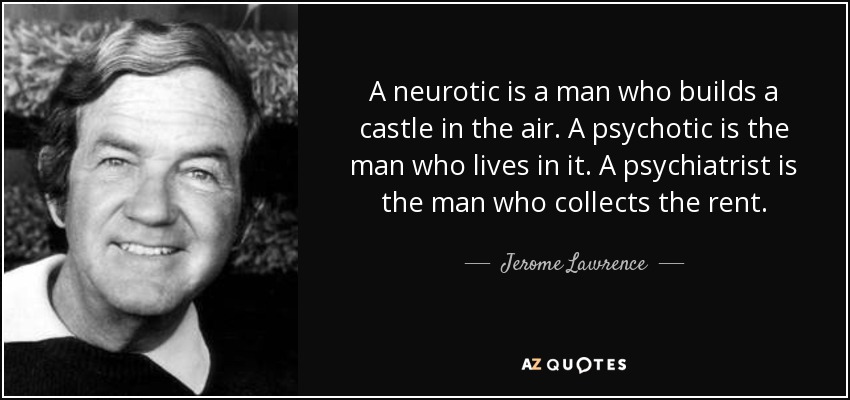Paul Whybrow
Full Member
A while ago, we discussed Turning Suffering Into Writing, but everyday neuroticism is a tool authors can use to good effect. Try to think of any type of a writer or any creative artist who stimulates you, that sees things in what would be deemed a conventional way. It's often a skewed viewpoint that captivates.
Neurosis is defined by the Cambridge dictionary as:
'A mental illness resulting in high levels of anxiety, unreasonable fears and behaviour and, often, a need to repeat actions for no reason'
It's easy to see how such symptoms afflict writers. After all, much of what we do is speculative, flights of fancy that our family and friends may view as delusional.
'The good writing of any age has always been the product of someone's neurosis, and we'd have a mighty dull literature if all the writers that came along were a bunch of happy chuckleheads.'
William Styron
Styron's Darkness Visible: A Memoir Of Madness is a moving chronicle of his own descent into depression and his triumphant recovery.
While writing a story, then editing it and creating a synopsis, followed by querying agents with a view to selling, it's likely that an author will ask themselves many times, "Why am I doing this?"

'If neurotic is wanting two mutually exclusive things at one and the same time, then I'm neurotic as hell. I'll be flying back and forth between one mutually exclusive thing and another for the rest of my days.'
Sylvia Plath, from The Bell Jar.
I've often contemplated my manuscripts, after reading them in as detached a way as possible, wondering if my theme worked, does the story arc ring true within this story and across the series and what would a reader take away from the story?
That way madness lies! Trying to guess what readers will notice is a form of fortune-telling. My beta-readers pointed out things to me which they liked, that I hadn't considered.
Telling someone that you're a writer produces mixed reactions, I think. Some people will admire you, while others will be intimidated. You may be thought of as wealthy, in a J.K. Rowling way, or as a total loser who can't write well, as you're not a household name. Most people will give you leeway to be just a bit weird!
Research has shown, that highly creative people are often neurotic:
Why Creative Geniuses Are Often Neurotic
To throw a reinterpretation on Robert A. Heinlein's book title Stranger In A Strange Land, authors are among the strangest folk in society, telling tales to entertain, inform and which reveal truths.
Have you embraced your neuroticism?

Jerome Lawrence
Neurosis is defined by the Cambridge dictionary as:
'A mental illness resulting in high levels of anxiety, unreasonable fears and behaviour and, often, a need to repeat actions for no reason'
It's easy to see how such symptoms afflict writers. After all, much of what we do is speculative, flights of fancy that our family and friends may view as delusional.
'The good writing of any age has always been the product of someone's neurosis, and we'd have a mighty dull literature if all the writers that came along were a bunch of happy chuckleheads.'
William Styron
Styron's Darkness Visible: A Memoir Of Madness is a moving chronicle of his own descent into depression and his triumphant recovery.
While writing a story, then editing it and creating a synopsis, followed by querying agents with a view to selling, it's likely that an author will ask themselves many times, "Why am I doing this?"

'If neurotic is wanting two mutually exclusive things at one and the same time, then I'm neurotic as hell. I'll be flying back and forth between one mutually exclusive thing and another for the rest of my days.'
Sylvia Plath, from The Bell Jar.
I've often contemplated my manuscripts, after reading them in as detached a way as possible, wondering if my theme worked, does the story arc ring true within this story and across the series and what would a reader take away from the story?
That way madness lies! Trying to guess what readers will notice is a form of fortune-telling. My beta-readers pointed out things to me which they liked, that I hadn't considered.
Telling someone that you're a writer produces mixed reactions, I think. Some people will admire you, while others will be intimidated. You may be thought of as wealthy, in a J.K. Rowling way, or as a total loser who can't write well, as you're not a household name. Most people will give you leeway to be just a bit weird!
Research has shown, that highly creative people are often neurotic:
Why Creative Geniuses Are Often Neurotic
To throw a reinterpretation on Robert A. Heinlein's book title Stranger In A Strange Land, authors are among the strangest folk in society, telling tales to entertain, inform and which reveal truths.
Have you embraced your neuroticism?

Jerome Lawrence
